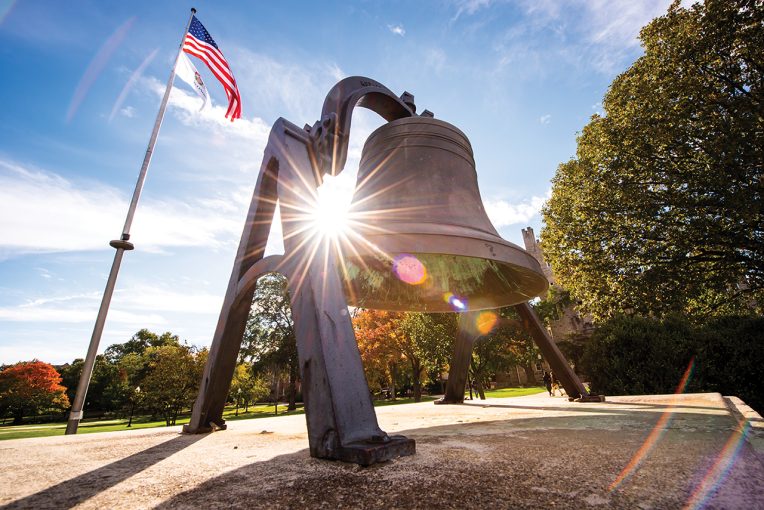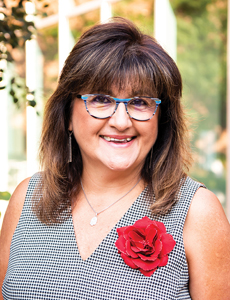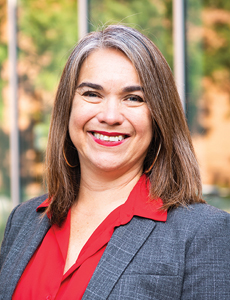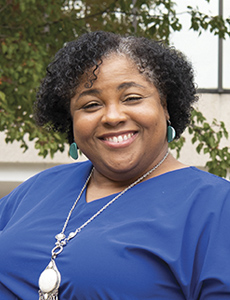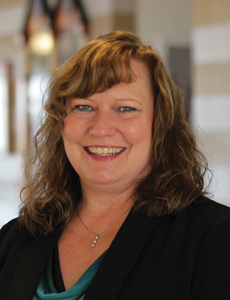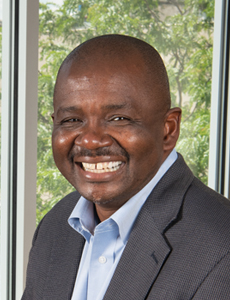One wanted to empower young girls, and that included pushing herself to become comfortable with camping in the wilderness. Another understood what immigrants felt like so she became an advocate for them. A young mother was so struck by her young daughter’s experience with otherness in her predominately white community that she had to do something. A teacher had to figure out how to keep her alternative school students engaged, or they would be headed to jail.
These are some of the stories of Illinois State University faculty/staff who are living the value of civic engagement through their leadership in community organizations. Why they’re involved is different for each of them, but what they have in common is that they’re changing the lives of others while also changing themselves.
For those who are hesitant to get involved because they don’t believe it’s the right time, or they’re not sure what skills they could offer, Dr. Dakesa Piña, one of those who shared her story, has some advice.
“We all have gifts that are meant to be shared,” she said. “No matter what that gift is, someone in our community is waiting to receive it. We all should see community engagement as a way to make a positive difference. We are the people who make up our community, which means we are necessary to build a healthy and happy community.”
Dr. Maura Toro-Morn
As a native of Puerto Rico, Dr. Maura Toro-Morn didn’t have to cross a border to come to this country, but sometimes it felt that way.
“I understand the process of migration as an insider,” said the sociology professor, who came to the U.S. in the early 1980s to pursue graduate work. The scholar of immigration issues has devoted her academic career to researching Latinx/a/o immigration to the Midwest and teaching about immigration, Latinos in the U.S., and gender issues.
As an advocate on immigration issues, she serves as vice chairperson of the board for The Immigration Project (TIP), an Illinois organization founded in 1995 to provide legal access and advocacy to immigrants.
“The work with TIP satisfies my desire and passion to advocate on behalf of immigrants and refugees and to recognize that migration is about people moving sometimes by choice, but more often by force—from a place that you know to a place that is completely foreign,” Toro-Morn said.
The organization covers 86 counties and is the only one of its kind in the area with full-time immigration attorneys, who are crucial to those trying to navigate the process of seeking legalization, she said. Legal advice is often unaffordable for immigrants.
TIP has served those from more than 60 countries speaking 15 languages, providing them with a path to become citizens, obtain work authorization, reunite with families, and be protected from deportation.
“Charlotte Alvarez, the executive director of the organization, is an inspirational leader who has helped grow the organization into a significant social service provider in the community,” Toro-Morn said. “Her staff also deserves high praise. The staff embodies the spirit of community with their work and have been an important voice in making Normal a safe community for immigrants.”
Illinois State University students work as volunteers and interns, she added. TIP has offices in Bloomington-Normal and Champaign-Urbana.
Dr. Rocío Rivadeneyra
As a young girl, Dr. Rocío Rivadeneyra wanted to be a Girl Scout, but it wasn’t something her mother was comfortable with.
A generation later, when her own daughter started kindergarten and became a Girl Scout, Rivadeneyra became her troop leader, although that wasn’t part of the plan. At the first meeting it was announced the troop needed a leader.
“I asked a question about the time commitment, and I became the leader,” Rivadeneyra said, with a laugh. She led the troop through their high school graduation 13 years later and picked up a second troop along the way.
“As a developmental psychologist, it was joyful to watch them get older,” the professor said. Before she became associate dean of the College of Arts and Sciences, she studied adolescent development, Latino/a psychology and cultural psychology. “Empowering girls to lead and be comfortable in the outdoors and challenge themselves was exciting to see, not just my own kids, but watching all of them develop into the powerhouse women that they are.”
Being a scout leader also pushed her to develop new skills, she said. Although she wasn’t initially comfortable with camping, she knew that would have to change. On a family trip to a national park she saw a Boy Scout troop backpacking and decided she needed to develop wilderness skills.
“I couldn’t deny my Girl Scouts something because I wasn’t comfortable with it,” she said. “I wanted them to get the same experience the boys got.”
She took wilderness training in the Great Smoky Mountains and took her troop backpacking at North Manitou Island off the Michigan coastline.
Scouting also taught her more about leadership.
“I’ve credited Girl Scouts with giving me the skills that made me comfortable jumping from faculty to administration,” she said. “You’re helping the girls become leaders. You’re challenging them and giving them skills, but you’re also learning and developing your skills and leadership.”
She is serving her second term as a national delegate to Girls Scouts of the USA, representing the Girl Scouts of Central Illinois. Although she’ll step back a little when her second troop graduates from high school in two years, she can see herself leading a bilingual troop or a troop for girls of color someday.
“This is an organization I can align myself with,” she said. “It’s always been at the cutting edge of pushing society. It was one of the first youth organizations that was integrated. In terms of social justice issues, they’ve always been on the right side of history.”
Julian Westerhout
When Julian Westerhout was a child, libraries were a treat. Good behavior warranted an extra trip, and that stuck with him.
“My parents instilled a love of reading in me,” he said. “I spent a lot of time escaping into other worlds through books, and they’re so key to education and learning. Libraries are so much more than books, they’re a gateway to knowledge, information, personal growth, it just goes on.”
That’s why the instructional assistant professor in the Department of Politics and Government gladly accepted a mayoral appointment to the Bloomington Library Board of Trustees in 2015. He’s served as president since 2018, and that put him at the helm when the library broke ground last June on a $25.2 million expansion with completion set for September 2023.
“This big expansion is something the library board has been trying to get done for 20 years,” he said. “Working with library board members and with library staff, city staff and elected officials over a series of iterated processes to get that through has been both challenging and rewarding. Like planners in the ’70s, it wasn’t easy to project what will be needed in a library in the next 50 years, he added.
“We can’t accurately predict what will happen 50 years from now, but we can provide the building with flexibility so we can react to different technology and needs of the community. Watching this process happen is really fulfilling. Certainly, I’ve been a very small part of that process, but for me it is an achievement to see it through.”
As he teaches, he talks about the importance of civic engagement and being active rather than passive in living your values.
“One of the things I try to stress is we are somewhat unique in the United States to be able to have an impact on our government and governance if you want to see change, if you want to see progress. Regardless of your political leanings, getting involved at the local level is easy and potentially rewarding.”
Dr. Dakesa Piña
Dr. Dakesa Piña’s daughter was in first grade when she came home from school and asked her mother to straighten her hair so she would look more like her classmates. A few years later when Piña noticed her daughter feeling othered and struggling with low self-esteem, she moved her to a more diverse school.
In 2013, the diversity, equity and inclusion officer in the College of Education became involved in the Bloomington-Normal chapter of Jack and Jill of America, Inc. (JJBN), an organization for mothers of children ages 2 to 19. Its purpose is to nurture future African American leaders by strengthening children and focuses on leadership development, volunteer service, philanthropic giving, and civic duty.
Piña took on a leadership role in her first year in the organization, chairing the Eastern Region Children’s Cluster, which brings children from seven states together for a leadership conference. Throughout her involvement, she has served as co-program director, parliamentarian, and age group director for several age groups.
What drew her to the organization was the shared belief that children are never too young to lead and serve in their local community, she said.
“It is difficult to find organizations focused on leadership skills for children as young as 2. My preschooler learned and participated in civic engagement, etiquette, public speaking, and much more through their monthly programming activities.”
JJBN has been a way for her family to connect with other families who have similar aspirations and goals for Black children, she added.
“Living in a predominately white community can be difficult for children of color. Representation matters for my children, and JJBN provides a space where they can learn, grow, and see examples of excellence that look like them.”
She encourages anyone considering community involvement, even if they’re uncertain what skills they could contribute, to take that first step.
Dr. Tamra Connor
As a student teacher, Dr. Tamra Connor didn’t expect her cooperating teacher to put her in charge of an applied economics class in the first week. But with the support of Junior Achievement (JA), she was able to provide a solid introduction to microeconomics.
“I fell in love with the Junior Achievement curriculum,” said Connor, a professor and associate dean for accreditation and operations in the College of Business.
JA provides lessons on life skills, focusing on financial literacy and career readiness for grades kindergarten through 12. Course materials are provided free to classroom teachers. Community volunteers visit classrooms to help deliver lessons, share real-world experiences, and mentor students.
When Connor graduated from Oklahoma State, she partnered with JA as a teacher at Street School, Inc., the state’s premier alternative education program. Students were either adjudicated into the school, meaning they had the choice of school or jail, or they were referred from their high school.
“All kids had some kind of crisis going on in their life,” she said. “I was teaching them economics. Most of the kids didn’t even know what economics was. I have a huge heart for Junior Achievement. I benefitted from teaching the program, and I saw my students get a lot out of the class.”
In 1997, Connor was honored as national Junior Achievement Teacher of the Year for economics. When she moved into higher education, she was no longer able to use the curriculum that ends with high school, but she did find a way back to the organization.
About five years ago she was walking through Festival ISU and saw a JA booth. She found out there was an opening on the local board, and that’s all it took. She joined Junior Achievement of Central Illinois and became a member of the executive board for McLean County.
Connor hopes to volunteer in a K-2 classroom this year, giving lessons on finance beginning with teaching kindergartners how to recognize nickels and dimes.
“You’re setting them on the path,” she said. “Junior Achievement is a phenomenal program.”
Mboka Mwilambwe
Mboka Mwilambwe ’94, M.S. ’96, was a teenager an ocean away when the Rev. Jesse Jackson first ran for president of the United States in 1984.
Mwilambwe, who is from the Democratic Republic of the Congo (then known as Zaire), spent his childhood moving up and down the western coast of Africa due to his father’s work as an international officer for UNICEF. With stays in Senegal, Ivory Coast, and the Republic of the Congo, Mwilambwe was well versed in different cultures and always eager to learn more. He was already envisioning a life of civic engagement.
From afar, he watched Jackson, a Black man, hold well-attended rallies in a country that passed the Voting Rights Act just 19 years earlier. Mwilambwe believed doors were opening for people who looked like him in the U.S.
Mwilambwe moved to Central Illinois in 1990. On April 6, 2021, Bloomington residents elected him as the first Black mayor in the city’s near 200-year history. His home country broadcast the news. He ran as a leader for all, but Mwilambwe understands and embraces the significance of his election.
“To me, it’s really helping younger generations envision the possibilities,” said Mwilambwe, who is also an assistant director at Illinois State University’s Office of Equal Access and Opportunity. “Not just Black, but any gender, race, and ethnicity.”
A U.S. citizen since 2008, Mwilambwe took the oath of office on a strong foundation of public service. A 10-year veteran on the Bloomington City Council, he has been a leader in both the community and at the University, where received his bachelor’s degree in mathematics and his master’s in education.
He pursued the mayorship to be a calming, experienced voice and to help make the surrounding area an attractive place for people to both come and stay. He contemplated stepping out of city politics after representing Bloomington’s Ward 3 for nearly a decade. It was time to give someone else an opportunity, he thought. But that all changed after the onset of the coronavirus (COVID-19) pandemic and George Floyd’s murder. Mwilambwe believed strong leadership was crucial in times of social and economic uncertainties.
He believes people must learn about each other’s backgrounds and perspectives in order to create connections and bridge divides. “Society is becoming increasingly diverse,” said Mwilambwe, who is fluent in four languages. “If you’re going to have to work with people who are different from you, it’s definitely important to understand part of their history and culture and things that are important to them. That tells them you value who they are.”
One of his main goals as mayor is to create an atmosphere where people can debate differences civilly. Disagreeing with each other without dehumanizing each other is an art, he said.
“When we do something collectively, like an election, and decide all of the sudden that this person who is very different from most and wasn’t born here is actually the person that we think represents our values, it transcends all those differences,” Mwilambwe said. “That’s the beauty
of America.”
